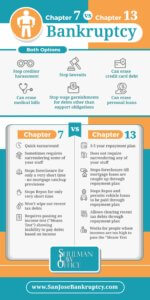 Nobody wants to file for bankruptcy, but it’s a key safety net for certain situations. If you are buried in debt, being harassed by creditors, and on the verge of losing your home, then filing for bankruptcy can be your way out.
Nobody wants to file for bankruptcy, but it’s a key safety net for certain situations. If you are buried in debt, being harassed by creditors, and on the verge of losing your home, then filing for bankruptcy can be your way out.
It’s an admission that you are not going to be able to handle your debt without some help, and a reset button to help you get your life back in order. One key question is whether you should file Chapter 7 or Chapter 13 bankruptcy. Understanding the differences between the two is vital.
What Both Kinds of Bankruptcy Achieve
Regardless of the kind of bankruptcy you file, there are some benefits that you will get from filing bankruptcy:
- Creditors will have to stop hassling you. When you file bankruptcy, something called an automatic stay goes into effect immediately. Your creditors have to stop trying to collect the money from you (with some exceptions, such as support obligations).
- Civil lawsuits will immediately stop. If you are facing a civil debt collection action and file for bankruptcy, the automatic stay will prevent a creditor from pursuing the case. Note that filing for bankruptcy does not halt criminal cases or family courts cases such as divorce or child custody.
- It can get rid of your credit card debt. The amount depends on the type of bankruptcy you are filing, but even under Chapter 13, you may be able to discharge quite a bit of that debt. This is because credit card debt is considered general unsecured debt, and has the lowest priority in a bankruptcy.
- It can get rid of medical debt. Like credit card debt, medical bills are considered general unsecured debt, and are easily wiped (under chapter 7) or maybe dramatically reduced or eliminated (under chapter 13) – this is why medical bankruptcy is a thing.
- It stops most wage garnishment. The automatic stay also stops wage garnishment, except for domestic support obligations. One big reason to file bankruptcy is if wage garnishment is leaving you without enough money to live on.
- It can discharge personal loans. which are also considered general unsecured debt.
So, that’s both kinds of bankruptcy, now let’s go through the differences.
Chapter 7 Bankruptcy
Chapter 7 bankruptcy is also known as “liquidation” bankruptcy; it’s for people who are so buried in debt they know that they can demonstrate that no payment plan is going to help. In order to get chapter 7, you have to pass a means test to show that you are literally unable to pay your debts. If not, you are still eligible to file chapter 13.
Chapter 7 bankruptcy has these features:
- It’s quick. Chapter 7 bankruptcy normally takes about three months to complete, although it can sometimes take longer. Then it is over and done with, and you can start to rebuild your life.
- You may have to give up some of your stuff. Your assets are listed and reviewed to determine whether they are protected (exempt) under your state’s exemption laws. This might include a home with too much equity. However, creditors can’t touch exempt property. This may include your home with equity that is covered by your exemptions, and may include most or all of your personal property, including clothing, household goods and appliances, cars, retirement accounts, and even cash or bank accounts. Each stat has its own exempt property list, so the number of assets that can be protected under chapter 7 will be different depending on where you reside.
- Foreclosure is halted only during the short period that the chapter 7 case is open, and a lender may petition the court to continue with it anyway. If you are behind on home mortgage payments, chapter 7 will not fix that and is most likely not the best bankruptcy option for saving your home.
- Vehicle repossessions are the same deal. If you are behind on payments and your auto lender is coming after your car, chapter7 will not fix that and is most likely not the best bankruptcy option for keeping your car.
- Chapter 7 does not wipe out tax debts owed to the IRS or to states for recent years. You will still have to pay those debts after chapter 7, although you may be able to establish a repayment plan separately with the tax agency.
Chapter 7 does wipe out most of your debt and give you a complete fresh start, but if you are behind on home or car payments, or own assets that are not exempt, it is usually not your best option.
Chapter 13 Bankruptcy
Chapter 13 is also called a reorganization bankruptcy. While a chapter 7 bankruptcy is to get rid of most unsecured debts you know you will never be able to pay, Chapter 13 is often a better option if one of these factors is present: 1) you can’t pass the chapter 7 Means Test; 2) you own assets that can’t be protected by your exemptions; 3) you are behind on car or house payments, or 4) you owe tax debts or other debts that cannot be wiped out in chapter 7.
Features of Chapter 13 include:
- Generally, a three to five-year repayment plan on debts, with first priority given to paying secured debts such as your mortgage or car loan, as well as recent tax debts. Other debts, including older tax debts and other general unsecured debts, maybe paid all, some, or none of the debt owed, depending on your income and your non-exempt assets.
- You will not have to surrender any of your stuff.
- A foreclosure will be halted, as long as you keep up with your chapter 13 repayment plan.
- Repossessions will also be halted, and your car loan can be included in your chapter 13 repayment plan.
If you have high debts and are not sure how to pay them all off, then it may be time to call a bankruptcy lawyer. Contact Shulman Law Offices for a free consultation. We can advise you whether bankruptcy is your best option. We’ll also help you decide which kind of bankruptcy to file, or help you determine if there is another way out of your current financial situation.


